NGO CSW 66: Women and Young Women of Faith Advancing Economic Development
On Monday, March 14, 2022, the Tanenbaum Center for Interreligious Understanding and the Network for Religious and Traditional Leaders showcased examples of women and young women of faith advancing economic development as part of the 66th session of the Commission on the Status of Women (CSW). The overall goal of this event was to highlight how each speaker works to improve local economies by creating employment for women and young women in all of their diversities.
Below are the biographies of the event moderator and panelists, as well as a summary of each panelist’s contribution to the three guiding questions and the Q&A portion of the event.
Moderator
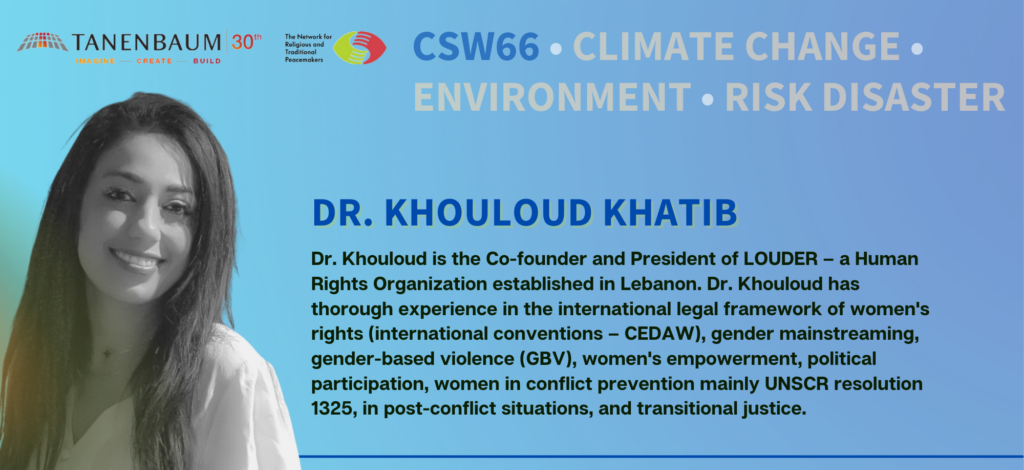
Speakers
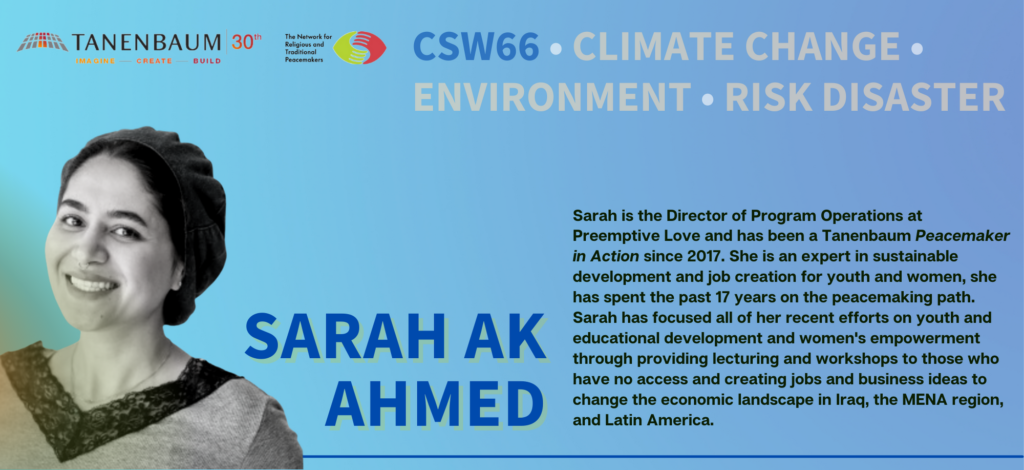
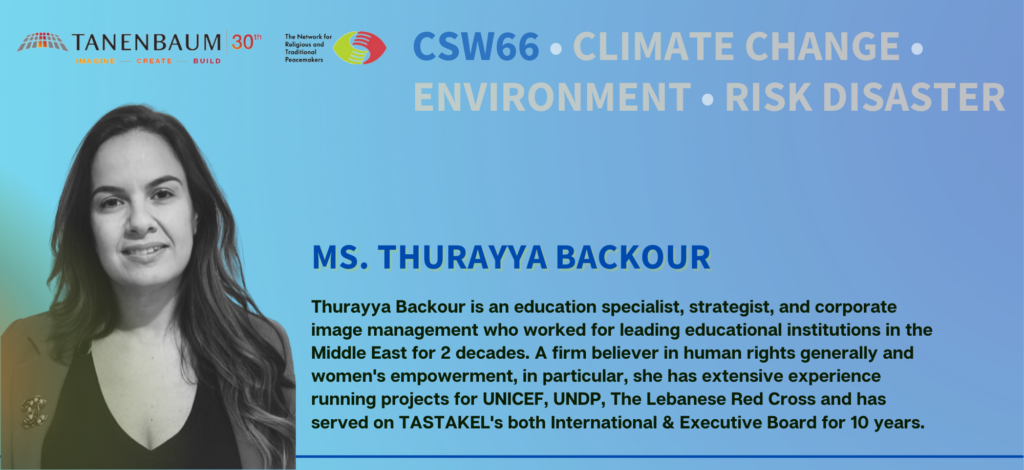
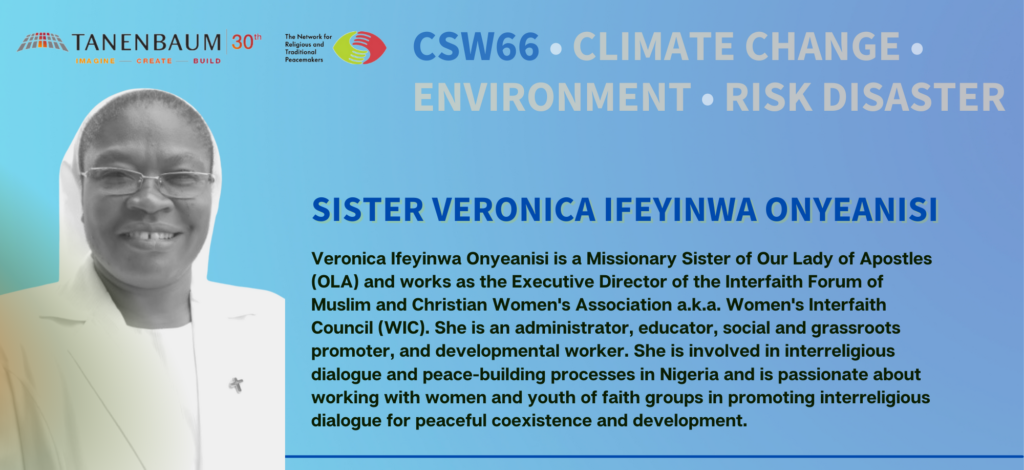
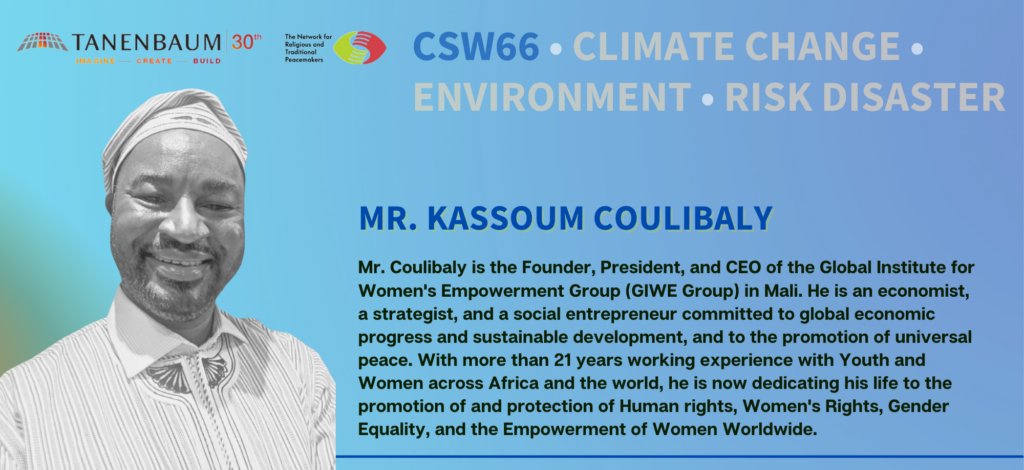
The discussion consisted of 3 guiding questions delivered by our moderator, Dr. Khouloud Khatib, who began with opening remarks:
- Climate change and disaster risk reduction policies remains one of the greatest challenges of the 12st century, and it is recognized that women are most vulnerable to the effects of climate change.
- We must recognize that without gender equity today, a sustainable and equal future remains beyond our reach.
- Analysis shows that improving gender equality can enhance economic growth, financial stability, and make societies more resistant to violent conflict.
Today, we must change the narrative that women are recipients of aid and victims of conflict; women are in fact peacebuilders, changemakers, and the ones responsible for building community.
Question 1: How have you been shaping and impacting your local economies to meet the needs of women and young women? What is the connection between women’s economic empowerment and peacebuilding?
Dr. Sarah AK Ahmed:
- Peacebuilding comes from economic development, as changemakers will naturally emerge from an empowering economy.
- Sarah’s work has always started in disadvantaged communities: IDP camps, refugee camps, host communities.
- Sarah follows 3 big steps:
1. Identify the communities in need and get involved. Listen to their needs, and analyze what shape the economy takes inside of those communities.
2. Link those communities with others that have gone through similar efforts. This creates a group of those who are“learning” from those with “lessons learned” through efforts such as entrepreneurship circles.
3. Do. For Sarah and her team, this most often takes the shape of developing sustainable self-owned microbusinesses. - It is important to hold space for women to imagine their own roles in creating and leading a business, as the economy is largely a male-dominated sector.
- Women tend to carry the heaviest load: they are expected to take care of the families, particularly in times of crisis or war, while also being the most subject to violence within not only their homes but the wider community. However, when women rise, their communities tend to rise with them.
- The link with peacebuilding is indeed massive: creating an additional sustainable income for families greatly reduces economic strain and thus decreases violence.
Thurayya Backour:
- In Syria, a huge number of families now consist of just women and children. Men were either at war, detained, missing, or dead.
- At first, the Tastakel organization began mentoring women in smaller communities to learn crafts and enter the workforce, in order to provide for their families.
- The focus shifted to reeducation, as they identified that many Syrian women were already educated but never expected to enter the workforce. Tastakel works to provide professional development for already capable women, and to open the path for them to play an important role in the peace process: getting more women at the negotiation tables and in the creation of local governments, as well as being heard internationally such as at the UN.
- In addition, Tastakel offers advocacy training, psychosocial support, and capacity building to encourage Syrian women looking to run their own small businesses, join the workforce, and take leadership positions such as public office.
Sister Veronica Onyeanisi:
- Women’s Interfaith Council (WIC) in Kaduna, Nigeria, educates the public on women’s rights through a radio program that discusses issues concerning women and young girls. As it stands, young women are faced with complex challenges without the means to meaningfully address them.
- Currently, a girl’s education in Nigeria often ends at home, in the kitchen. Young girls are married off as early as 12 years old.
- WIC enlists faith and traditional leaders to support women’s advocacy. Although women champion their own cause, they need their male counterparts to spread the message.
- For a woman to have a voice, she must be economically empowered. When a woman must depend on her husband for everything, it will create conflict. Making contributions to the household restores dignity and allows for the children to go to school without depending on the husband. Human rights begin with dignity at home.
- WIC provides skill acquisition training to women, as well as capital to start a business and mentorship throughout the process.
Kassoum Coulibaly:
- It is crucial to include young boys in the conversation around women’s rights, so that men can become part of the solution.
- Kassoum and his organization have developed a pilot initiative to bring women into the agricultural sector. The results are a stronger economy and more food security, which directly impacts the overall security situation in Mali.
Question 2: What barriers do you see facing faith actors and their communities in advancing women’s leadership and participation in the economy? How have you been addressing these barriers?
Dr. Sarah AK Ahmed:
- There are three big challenges:
1. Misinterpretation of religious beliefs about women and their abilities, all while having to uphold religious and traditional values.
2. Women in certain cultures and contexts simply have to work harder to be recognized and heard.
3. Respecting and honoring tribalism while trying to close gender gaps. - There are ways to break these barriers. The first is to identify women who want to get involved, reach out and support them. The second is to lead by example: “Empowered women empower women”.
Thurayya Backour:
- Tastakel found it must enlist the help of faith actors, as many target groups needed their faith representatives to reassure them they were right, and within their rights, to seek employment and a bigger role.
- There are already fewer resources available for women, for Syrian women it becomes a matter of seeking dwindling aid in a country and situation that is not their own. A common example of this is simply the language barrier between them and the host communities.
- Faith actors need to advocate for the shifting social norms, to insist that the traditional role of unpaid care work provided by women had to be set aside, as women were now providing both care and income for their families.
- The stigma around gender-based violence must also be lifted. Currently, If two men fight, it is an honorable story to tell. However, If a woman is harassed at work, it is something to hide.
- Enlist faith actors to fight against those using faith to keep women down.
Sister Veronica Onyeanisi:
- One of the biggest challenges is indigenous and cultural harmful practices, which are often backed up by religious text.
- There is a focus on pudor: women are expected to stay at home and not carry out activities. It hinders their leadership positions, as even those with access to decision-making positions are often there for show and not actually listened to.
- In Nigeria, faith actors are struggling with insecurity issues, there are bandits and kidnappings that render travel largely unsafe.
- IWC has created a “Mother School”. While not a formal schooling, it teaches mothers how to raise and care for their children instead of ignoring them.
Kassoum Coulibaly:
- The biggest challenge is the patriarchal element of most religions, which does not allow for women to hold important office within their religions.
- Secondly, the coordination of faith leaders is lackluster. Mali is a multi-faith country, it has large Muslim, Christian, and traditional faith populations. However, each of these communities is working on their own rather than banding together to support women globally and within their communities.
- In addition, faith leaders are not properly mixing their own faith knowledge with the technical skills and analysis around gender that human rights activists and NGOs have been producing for years.
- The economic challenges are numerous: women have less access to capital, less access to technology, and less access to the political system.
Question 3: What is one solution you would offer to the audience to help bolster women’s participation and leadership in the workforce, especially young women?
- Dr. Sarah AK Ahmed: To hold a big space for women and young women to express who they want to be, and support them in following that intention.
- Thurayya Backour: To prioritize women’s access to employment, and to engage faith actors to fight against inhibitors such as child marriages, oppose extremist voices, and encourage women’s participation in their communities.
- Sister Veronica Onyeanisi: To educate young women in a supportive environment that teaches them the skills they will need to work well. Once they reach the workplace, to pay them the same as their male counterparts, and to provide proper maternity leave to allow mothers the time to be with their newborn children.
- Kassoum Coulibaly: To bring young women into the agricultural system in Africa. When we will be able to feed Africa, we will be able to bring peace and sustainable development to its regions. Educating young girls in agriculture allows for a higher chance at creating a sustainable business, having access to capital, and owning land.
Q&A
Question 1: Any ideas on how to contribute to post-conflict reconstruction efforts
- Dr. Sarah AK Ahmed: To work together. Many actors from all sectors tend to work in silos. When you are looking at destroyed communities, the intervention will be long term and that is where coming together to help one another will make the most sense.
Question 2: How are faith actors uniquely positioned to advance the role of women?
- Thurayya Backour: In war-torn regions, the role of faith actors becomes primary. People tend to revert more to faith when in crisis. When there is no rule of law, no trust in government or politicians, the only remaining system is faith. In Syria, where there are many religions and factions, seeing faith leaders sit at the same table conveys the message that people can do that also. Faith can present a role model.
- Kassoum Coulibaly: We must reeducate and retrain faith leaders on how they teach and preach. Currently, in Mali, faith leaders can be disconnected from reality, instead focusing on paradise and life after death. Today, they must also speak about solving daily problems and current realities. It is the role of faith leaders to coach and mentor people into solving their own problems in an ethical manner.
Governments tend to use faith to come into the public space and manipulate listeners. Faith leaders should not engage in that manipulation, and always speak the truth about governments that fail to bring good policy or kill their own people.
Question 3: What can NGOs in the “Global North” do to support and advance the role of women of faith in the “Global South” ?
- Sister Veronica Onyeanisi: The best way to support the Global South is to advocate for and support good policy: “Injustice anywhere affects justice everywhere”.
- Dr. Sarah AK Ahmed: A refinement of global foreign policy. UN agencies, for example, tend to target support where the “hype” is, wherever the public eye is looking at. Today, it is Ukraine, tomorrow it will be elsewhere. It is more sustainable to support local actors and changemakers.
- Thurayya Backour: Synergies of change can be achieved through very small partnerships: organization to organization, people to people. Creating these relationships between the Global North and Global South is a great way to have both sides learn from each other. We tend to think big: the UN, big policy changes. But there are hundreds of policies that are being ignored.
- Kassoum Coulibaly: Any partnership must be a partnership of equals. We often think of what the Global North can bring to the Global South, but not the other way around. Africa has 2 billion people, 600 million of these are young women. These young women will have ideas and should be taken into consideration when setting agendas for the future.
- Dr. Khouloud Khatib closed the Q&A with an excerpt from Eleanor Roosevelt:
“Where, after all, do universal human rights begin? In small places, close to home – so close and so small that they cannot be seen on any maps of the world. Yet they are the world of the individual person; the neighborhood he lives in; the school or college he attends; the factory, farm or office where he works. Such are the places where every man, woman and child seeks equal justice, equal opportunity, equal dignity without discrimination. Unless these rights have meaning there, they have little meaning anywhere.
A final tweet!
Before closing the event, Dr. Khouloud Khatib asked all panelists to send us off with a short “tweet” encapsulating their message today:
Dr. Sarah AK Ahmed: “Empowered women empower women”.
Thurayya Backour: “Empowered women make the world a better place.”
Sister Veronica Onyeanisi: “Continue to empower women, ensure they are qualified, equipped, and ready for any position they aspire to”.
Kassoum Coulibaly: “When we empower women, we empower our communities. Faith leaders should be at the front of that thinking and action. And let’s bring more men and boys into the conversation!”